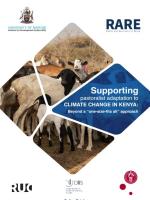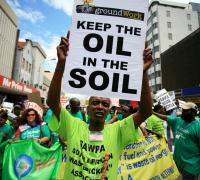Climate change adaptation: One size does not fit all
A new policy brief from the Rights & Resilience programme examines the climate change adaptation strategies of Maasai pastoralists in Kenya and discusses the implications for policy and practice.
The brief shows how people actively seek to adapt to climate change on their own account, but also that their adaptation strategies are diverse and composite. Wealthy, poor, and middle-class pastoralists follow different strategies, as people craft their adaptation pathways around whatever assets they have available. Land rights are also critical for the way people adapt: In the areas studied, people adapt differently under different land tenure systems.
National adaptation policies, local government plans and many adaptation projects do not take this into account but tend to assume that all pastoralists are the same and adapt in the same way. As a result, support to adaptation may end up being ineffective, inappropriate, and wasted.
The brief recommends that adaptation policies and projects must take people’s own adaptation strategies as the point of departure, rather than introducing universal solutions. Devolved adaptation mechanisms are being piloted in Kenya and other countries, which can be used as the basis for such an approach. These mechanisms must however place more emphasis on accommodating the diversity of adaptation strategies. This includes providing particular funding for adaptation among poor households, and accommodating different adaptation strategies in land use planning.
The policy brief is one of a series prepared by the collaborative Rights & Resilience (RARE) research program which studies the interaction between climate change adaptation and land rights in Kenya. The briefs can be downloaded here:
- Supporting pastoralist adaptation to climate change in Kenya (pdf)
- Why Land Rights are Important for Climate Action (pdf)
- Kenya’s Community Land Act and Pastoralists’ Access to Land for Adaptation (pdf)
- Closing the Climate Information Gap: The role of NGOs in Kenya (pdf)
RARE is a collaborative effort by the University of Copenhagen (lead), University of Nairobi, DIIS, Roskilde University, and the International Livestock Research Institute (ILRI), with funding from the Consultative Committee for Development Research (FFU). For more information, see the RARE website.
DIIS Experts



